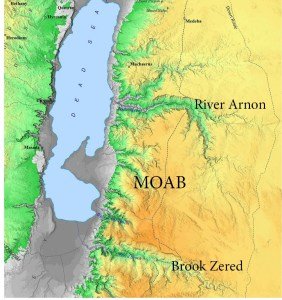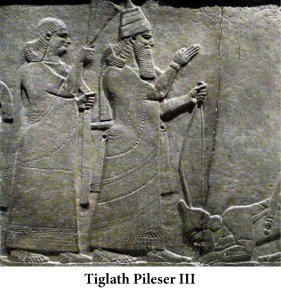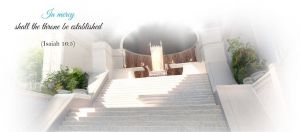“Let Mine Outcasts Dwell With Thee, Moab” – Jordan in Bible Prophecy (1)
In Isaiah 15-16 we have a prophecy which speaks of the burden of Moab. It is a chilling chapter of judgment on a people who were notorious for their insufferable arrogance. As chapter 16:6 testifies: “We have heard of the pride of Moab; he is very proud: even of his haughtiness, and his pride, and his wrath: but his lies shall not be so”.
 Moab in the prophet’s day was confined to the area east of the lower section of the Dead Sea. On every side it was fortified by nature. On the north was the tremendous chasm of the river Arnon and on the south, the deep gorge of the brook Zered. North of this was the original “land of Moab” (Deut 1:5, 32:49), which descended to the Jordan floor, styled the “plains of Moab” in Numbers 22:1. On the west of the tablelands were rugged heights, interspersed by one or two steep defiles, and on the south and east were a series of semi-circular hills giving way to the vastness of the eastern deserts.
Moab in the prophet’s day was confined to the area east of the lower section of the Dead Sea. On every side it was fortified by nature. On the north was the tremendous chasm of the river Arnon and on the south, the deep gorge of the brook Zered. North of this was the original “land of Moab” (Deut 1:5, 32:49), which descended to the Jordan floor, styled the “plains of Moab” in Numbers 22:1. On the west of the tablelands were rugged heights, interspersed by one or two steep defiles, and on the south and east were a series of semi-circular hills giving way to the vastness of the eastern deserts.
Origins
Moab’s origins came as a result of the incestuous union between Lot and his daughter (Gen 19:31-37). From Zoar, Lot moved eastward from the Dead Sea and south of the Arnon where his sons were born (Gen 19:30). The country was originally inhabited by Emim (Deut 2:10), but these people were eventually defeated by the emerging power of the children of Lot. Before its conquest by Sihon and the Amorites, Moab shared a border with their brother Ammon. Sihon arrived on the scene many years later and pushed the Moabites back to the river Arnon where they stayed until the days of Mesha, who retook the area from a weakened Reuben and Gad.
In the Scriptures, Moab is associated with cursing (Num 22:6), seduction (Num 25:1-2), inhospitality (Jud 11:17), oppression through Eglon (he was the first of the oppressors after Joshua’s death—Jud 3:12), idolatry mingled with child-sacrifices (1 King 11:33; 2 King 3:27) and a continual scorn towards God and His people ( Jer 48:42; Zeph 2:8). For these reasons everyday Moabites were not permitted into the congregation of Israel until the 10th generation (Deut 23:3-6).
History
In the time of the Judges, there was some degree of interchange between Israel and Moab (Ruth 1:1-6). In the days of Samuel, Saul vexed them (1 Sam 14:47) and this is probably why David could approach Moab and seek refuge for his family, because he was seen to be Saul’s enemy (1 Sam 22:3).
David later brutally subdued the region and made it a tributary (2 Sam 8:2-12, 23:20; 1 Chron 18:2). The annual tribute amounted to 100,000 lambs and 100,000 rams (2 King 3:4) and this tax windfall appears to have been transferred to the northern kingdom after the division. This tribute lasted until Moab threw off the yoke in the days of Ahab (2 King 1:1, 3:4-5).
Because of Mesha’s revolt, Jehoram allied himself with Jehoshaphat, and invaded the region, devastating wells and trees until the king, in desperation, offered up his son as a human sacrifice in an attempt to shock his enemies into retreating (2 King 3:24-27). They managed to rally and join a huge confederacy, which penetrated Jehoshaphat’s southern defences and threatened to exterminate Judah. God, however, intervened and, by faith, the confederacy of evil was destroyed (2 Chron 20, Psa 83).
Timing of Isaiah 15–16
With this background of violence and animosity in mind, we are all the more startled to read in Isaiah 16 that one day Moab will be asked to care for God’s people. In fact, this hiding of refugees is the only good quality Moab is ever noted for and is alluded to in this chapter and in Jeremiah 40:11.
The prophet’s words in Isaiah 16:1-5 are as follows: “Send ye the lamb to the ruler of the land from Sela to the wilderness, unto the mount of the daughter of Zion. For it shall be, that, as a wandering bird cast out of the nest, so the daughters of Moab shall be at the fords of Arnon. Take counsel, execute judgment; make thy shadow as the night in the midst of the noonday; hide the outcasts; bewray not him that wandereth. Let mine outcasts dwell with thee, Moab; be thou a covert to them from the face of the spoiler: for the extortioner is at an end, the spoiler ceaseth, the oppressors are consumed out of the land. And in mercy shall the throne be established: and he shall sit upon it in truth in the tabernacle of David, judging, and seeking judgment, and hasting righteousness.”
But before these events occur, the prophet must first talk of judgment on the people. Isaiah 16:6 hints at the unbearable pride of Moab. The decree of the Watchers had been given and Moab’s evil had passed the bounds of propriety (Dan 4:17; Amos 2:1-3). She was ripe for judgment. Now God, through Isaiah, had been denouncing haughtiness amongst the nations (Isa 2:10-12, 5:15, 10:13-16, 14:1-14) and therefore it was inevitable that the hand of judgment would descend upon Moab. She was the epitome of pride and scorn and would not escape unscathed.
 In Isaiah 16:14 we are told that within three years of Isaiah’s words, Moab was to be devastated. The distress would arrive in the night (15:1), wells and reservoirs would be blocked up (15:6), grass for the animals would fail (15:6), the wild animals would feel emboldened to roam free (15:9) and the wailing and weeping of the people would be heart-breaking to witness (15:8). In the end Moab would be “very small and feeble” (16:14).
In Isaiah 16:14 we are told that within three years of Isaiah’s words, Moab was to be devastated. The distress would arrive in the night (15:1), wells and reservoirs would be blocked up (15:6), grass for the animals would fail (15:6), the wild animals would feel emboldened to roam free (15:9) and the wailing and weeping of the people would be heart-breaking to witness (15:8). In the end Moab would be “very small and feeble” (16:14).
Isaiah was so distressed at seeing this judgment that his own heart was affected by the devastation (15:5). His bowels of com- passion were moved as he prophetically described the nation’s distress in harrowing terms (16:11).
The immediate fulfilment
Who is the invader that wrought such havoc? Isaiah 16:8describes the aggressor as “the lords of the heathen” (Heb. bale goyim), or as Rotherham translates this, ‘the owners of nations’. There was really only one power at the time that owned other nations and that was the Assyrian.
As we shall see from the prophecy itself, Judah, at the time of this pronouncement, was untouched by the Assyrian advance. This means that the Assyrian king who invaded Moab reigned before Sennacherib’s time and must have been either Tiglath-Pileser III or his son, Sargon, both of whom are mentioned in Scripture (2 Chron 28:20; Isa 20:1).
Tiglath-Pileser III subjugated much of the Near East region; including his fellow Mesopotamians in Babylonia and Chaldea, and further south still, the Arabs, Magan, Meluhha, and Dilmunites of the Arabian Peninsula. In the south west, Israel, Philistia, Samarra, Moab, Edom, and Nabatea fell. It was left to his younger son, Sargon, to take Samaria and destroy the northern tribe of Israel. Judah, for the moment, was left untouched.
It is most likely then that Tiglath Pileser was the destroying instrument that God used to judge Moab.
There is an obscure reference in Amos 6:14 that the advance of Assyria (probably Tiglath-Pileser III) went as far south as “the river of the wilderness” (nasal ha’arabah), which one commentator interprets to mean the wadi that separates Moab from Edom (wadi Zered). If this is correct, then we have Assyrian penetration this far south during the days of Ahaz.
Send ye a lamb
The question on the prophet’s mind would have been: how can Moab survive this onslaught? Isaiah 16 provides the answer. The prophet describes the fleeing Moabites in these terms: “As a wandering bird cast out of the nest, so the daughters of Moab shall be at the fords of Arnon” (16:2). They are racing south to escape the Assyrian juggernaut and they are so dazed and disoriented that they are like a helpless bird running around in circles. They arrive at the great chasm of the Arnon and are unable to press forward to secure their safety. No one knows what to do next!
It is here that God offers Moab a way out. “Send ye the lamb to the ruler of the land,” writes the prophet, “from Sela (or Petra) to (Heb. in) the wilderness, unto the mount of the daughter of Zion” (16:1). How can the giving of a single lamb (there is no definite article in the Hebrew) save them? How could this offer ameliorate Moab’s plight? Being a single lamb, it is clearly not a tribute (cp 2 King 3:4-5); it is instead a symbolic gesture representing a gift, a token of homage, an offering. Moab is being asked to recognise that salvation from the enemy can only come if they are prepared to submit to true worship in mount Zion.
 Can we picture this scene? The Moabites are screaming in flight and Isaiah cries out to them in loud and urgent terms—submit to God in Zion. The voice echoes along the steep passes and defiles until it penetrates into the remotest hiding places in Petra. It is an appeal—send an acknowledgement of need; send a representative sacrifice and recognise that only the God of Israel in the temple in Mount Zion can help!
Can we picture this scene? The Moabites are screaming in flight and Isaiah cries out to them in loud and urgent terms—submit to God in Zion. The voice echoes along the steep passes and defiles until it penetrates into the remotest hiding places in Petra. It is an appeal—send an acknowledgement of need; send a representative sacrifice and recognise that only the God of Israel in the temple in Mount Zion can help!
How gracious this offer from God was; how sad it is to see it ignored.
The future intrudes
In Isaiah 16:5 we are introduced to a future event: “And in mercy shall the throne be established”. When the prophet wrote, the throne of David had already been in existence for many years (1 King 2:12,24), but here is a prediction that uses the future tense. It implies that the throne has been removed at some point in Israel’s history and needs to be restored once more.
This prompts a series of questions. If this is a future prediction, where should the transition appear between the historical events of the Assyrian invasion and the establishment of the future throne of David? Is the break after verse 1 or after verse 2? Does the prophet describe similar events or contrasting events? Furthermore, is verse 4 dealing with Moabite outcasts or Israelite outcasts?
It would appear that the transition from past to future occurs after verse 2 for the following reasons:
- Chapter 15 describes the flight of Moab from the enemy and 16:1-2 continues that description. Indeed, the specific place names of chapter 15 are continued in 16:1-2,6-11. On the other hand, there is a deliberate generalisation of geographic detail in verses 3-5 (the nation is just called Moab) implying that the specific Moabite cities are just not around in the future in the same way they were in the past.
- The command of verse 3, “take counsel, execute judgment”, could hardly be given to a people as they are fleeing for their lives. The implication is that the Moabite power who is being addressed in verse 3 has the capacity to hold a counsel and formulate a national policy to look after some outcasts. This is highly improbable if it is being given to a people who themselves are being destroyed and fleeing for safety.
- The outcasts who need to be sheltered are termed, “mine outcasts” in verse 4. This is a term that is an appropriate description of God’s people, not Moabites. It is a call for Moab to care for God’s outcasts, not a call for Israel to care for Moab’s outcasts. Furthermore, we have a national historical precedent of Jews fleeing for refuge from a northern invader in the lands east of Israel (Jer 40:11-12), not the other way around.
Isaiah frequently moves from the present to the future with little advance warning and this is one of those transitions. This time the future is introduced as a complete contrast to the events Moab experienced at the hands of the Assyrian. Moab, in Isaiah’s day, had been asked to submit with a token recognition of submission to the God of Israel in 16:1. Verse 6 implies that there is an outright refusal to do so. Its pride cannot allow it to do this. In the future, however, the picture will be entirely different. There will be a Jewish throne established and all people will be subject to it.
They might refuse to submit in Isaiah’s day, but through inspiration, the prophet is caused to look into the distant future and see a totally different response. In that day they will be asked to hide and care for God’s people. There will be an invader in the land of Israel at that time and, hence, Moab is being assured that he will be defeated and therefore they need not fear any repercussions. Indeed, there will be a throne of glory established in Zion and this king will seek judgment on all those who disobey.
With this in mind, let’s examine the prophet’s words closely. The command of verse 3 reads thus: “Take counsel, execute judgment; make thy shadow as the night in the midst of the noonday; hide the outcasts; bewray not him that wandereth”.
As mentioned previously, this is a different Moab to that described earlier in the burden, fleeing to preserve its national existence. Clearly something has changed to allow Moab to transition from a fleeing power to a protecting power. The events and timing are not the same as 15:1–16:2. In these verses, Moab is herself being thrown out of the land and would not be in any position to succour anyone. Yet, here, she is now able to protect fleeing outcasts. The change is dramatic. The prophet has segued to the future.
Take counsel
The command, “take counsel” (Isa 16:3) is better translated, ‘bring counsel’. They are asked to consider the appeal carefully and with due deliberation, but the words suggest an urgency as well.
The imperative from heaven has been given: “Make thy shadow as the night in the midst of the noon day”. Noon is the middle of the day and therefore represents the hottest part of the day (2 Sam 4:5) and by extension the time of greatest trial. A shadow on the other hand is a symbol of defence and protection (Num 14:9; Psa 17:8, 36:7). It is the same kind of protection that God Himself offers (Isa 4:6, 25:4-5), hence this injunction seeks from Moab the same extensive care and protection God provides.
Specifically, God wants Moab to “hide the outcasts; bewray (Heb. to disclose) not him that wandereth. Let mine outcasts dwell with thee, Moab; be thou a covert to them from the face of the spoiler: for the extortioner is at an end, the spoiler ceaseth, the oppressors are consumed out of the land” (Isa 16:3-4). Here are God’s outcasts, driven from their land by invasion and hunted mercilessly by the enemy. They are fleeing for their life and Moab is commanded to protect them from the storm and hide them. So who is the spoiler and when will this event take place?
(To be continued)
Reproduced by kind permission of Bro Carl Parry (Editor)

